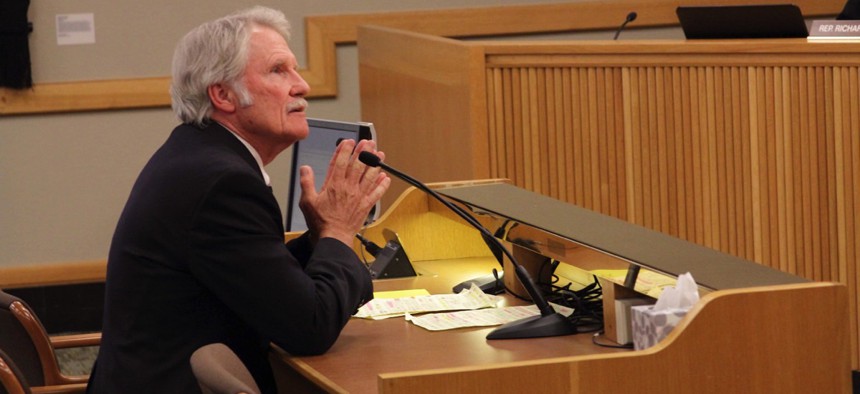Oregon’s Legal Fees in Oracle Case Shock GOP Leader; ‘Foul Mess’ in Missouri Town

Gov. John Kitzhaber sought a lawsuit against Oracle Corp. over Oregon's online health insurance enrollment system, the failure of which embarrassed the state and resulted in multiple investigations. Chad Garland / AP Photo
Also in our State and Local Daily Digest: Indiana to use reserves for road and bridge repairs; West Virginia sets up new flood recovery fund; and Juneau deals with a massive fish spill.
SALEM, OREGON
LAWSUITS | Oregon’s costs for a legal battle with Oracle Corp. could exceed $27 million by next April. The state has already spent almost $16 million on the case, which stems from the botched deployment of the Cover Oregon heathcare exchange. "I had feared it would be extremely high, but my God, I'm shocked by that number," said Mike McLane, House Republican leader. Oracle is fighting back hard. The company has hired seven law firms and filed five lawsuits against the state. Attorney General Ellen Rosenblum is showing no signs of backing down. "This case is about making sure Oregonians are paid back fairly for the miserable job performance of a corporate contractor that we hired," she said. "We paid $240 million to Oracle to produce a health exchange that never worked." [OregonLive/The Oregonian]
BLACKBURN, MISSOURI
INFRASTRUCTURE | A small lake here is emptying out and turning to mud, as the railroad that owns it refuses to fix a dam that broke last year during heavy rains. For this town of about 250 people, located roughly 70 miles east of Kansas City, the lake is not only a landmark but also a source of water for volunteer firefighters. But the railroad, Kansas City Southern, says it has no use for the lake, which is said to have provided water for passing locomotives during the Steam Age. The mayor calls the situation surrounding the dying body of water a “foul mess.” Racoons and other animals are preying on the dead fish that litter its mucky remains, and it can smell bad. “The lake has always felt like it belonged to the town,” said Wesley Steffens, whose home is near the lake. “We’re seeing now that it’s the railroad’s.” [The Kansas City Star]
HOUSTON, TEXAS
ABORTION | The two California anti-abortion activists, who secretly filmed themselves attempting to buy fetal tissue from Planned Parenthood, were cleared of the last remaining charge against them by a Texas judge Tuesday. David Daleiden, 27, and Sandra Merritt, 63, could have spent up to 20 years in prison if convicted on the felony tampering with government records charge. Prosecutors argued the pair used fake driver’s licenses to hide their identities from Planned Parenthood, who they accused of illegally selling tissue to researchers. A grand jury investigating Planned Parenthood, as a result of their videos, ended up indicting the duo instead. [The Associated Press via WTOP]
INDIANAPOLIS, INDIANA
RESERVES | Indiana’s $2.24 billion reserve fund is the largest in state history. This fiscal year, Indiana government plans to spend $427.9 million from reserves on state and local road and bridge preservation. Last year’s tax revenues were lower than expected because of low gas prices, but not so diminished that Indiana had to scrap its road funding plan. "Indiana's fiscal condition remains strong," said State Auditor Suzanne Crouch. "By operating with a balanced budget and living within our means, Indiana has maintained strong reserves as well as our 'AAA' credit rating." [The Times of Northwest Indiana]
CHARLESTON, WEST VIRGINIA
DISASTER RECOVERY | Small businesses impacted by West Virginia’s historic flooding are eligible for funding assistance of up to $10,000 through a new public-private partnership announced by Gov. Earl Ray Tomblin. The program, called RISE West Virginia, will tap funding from the state’s race track modernization fund and contributions from private sources. “This is crucial for flood recovery for a brighter future,” according to the governor. [Charleston Gazette-Mail]
JUNEAU, ALASKA
PUBLIC WORKS | A flatbed truck carrying a large amount of salmon tipped over on a road in Alaska’s capital city, creating a fishy mess for local authorities to clean up on Monday. A fish company said 16,000 pounds of chum salmon will need to be discarded because it’s now considered contaminated. [Alaska Dispatch News]





